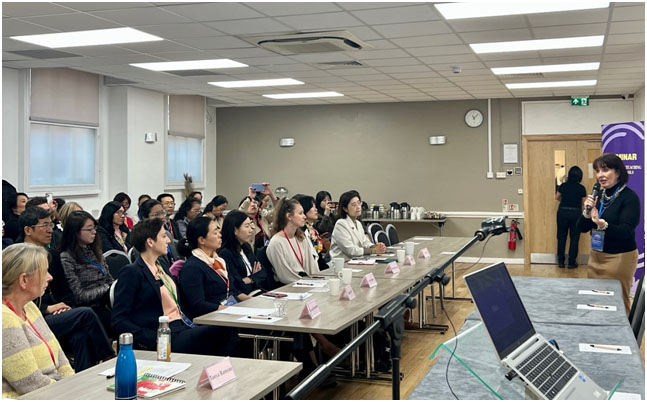Seminar discusses UK Mandarin-learning expansion
By Zheng Wanyin in London | chinadaily.com.cn | Updated: 2023-09-23 12:57

Leaders and representatives from governmental departments for languages, schools and other stakeholders across the United Kingdom gathered in London on Thursday to address the topic of establishing a more expansive and sustainable Mandarin-learning system in the country.
Naomi Stauber, deputy director of Curriculum Strategy, Humanities, English, Arts and Languages Division at the Department for Education, or DfE, said in her opening remarks that Mandarin is a key language for UK pupils.
"Mandarin is spoken by more than 1 billion people worldwide. It is key to enable our young people to connect with others internationally, to build relationships that transcend borders, and to support mutual understanding," she said.
She also said that the DfE is planning to expand "one of the department's most successful" language-delivery programs, the Mandarin Excellence Program, or MEP.
Starting in 2016, MEP is a project funded by the DfE and delivered through state secondary schools in England, with support from the British Council and the Confucius Institute for Schools at the University College London Institute of Education, or UCL IOE.
Students on the MEP are required to acclimatize themselves to the intensive nature of the project, with an average of eight hours of work per week, which could consist of in-classroom lessons, after-school teaching, self-study, and more.
"Over 11,000 students have benefited from the MEP since it started. There are currently 81 schools participating in the program and we plan to expand this into 100 schools by September 2024," she said.
According to Stauber, the DfE has already begun expanding the MEP into the sixth form, the final two years of pre-university study in the English school system. Currently, the program is designed to be completed after students finish the last year of compulsory secondary education, before the sixth form.
In addition to the MEP, Katharine Carruthers, director of UCL IOE Confucius Institute for Schools, said there has been an ongoing dialogue with primary schools, secondary schools and universities on how to build a more centralized Mandarin-learning system, with the aim of sustaining students' language knowledge.
She said "transition" is important but difficult in England, as she observed that many primary schools were barely out of the starting blocks with their curriculum on foreign modern languages, including Spanish and French, which are the most commonly taught in English schools.
"What the MEP has shown is that, if you give children enough curriculum time, British kids can learn languages," she said, noting that the MEP graduates have achieved notable results in Mandarin Chinese at GCSE level, the academic examination taken in the UK at the age of 16.
According to data released by the UK government, in 2022, nationwide 79 percent of MEP pupils achieved grades above 8 or 9, the two bands aligned with the highest grade, A*.
"It is really important for the country. It is really important for bilateral relations. We cannot just rely on Chinese young people to speak really good English," said Carruthers.
























